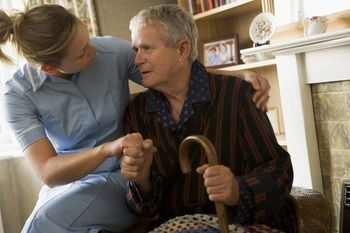 In addition to the complicated financial requirements for becoming eligible for MassHealth long term care benefits, an applicant must also qualify physically. This of course makes perfect sense. If the government provides a service as costly as long term care to individuals for free, then there must be some way to measure the medical necessity of that service. Generally, apart from those requiring highly intensive care or rehabilitation from a serious injury (e.g. intubation or a serious stroke), individuals must have a need for certain levels of regular assistance. And in the world of federal Medicaid (and MassHealth) regulations, this measurement of assistance is based on “activities of daily living” or “ADLs” for short. To qualify for MassHealth, an applicant must require assistance for at least three ADLs
In addition to the complicated financial requirements for becoming eligible for MassHealth long term care benefits, an applicant must also qualify physically. This of course makes perfect sense. If the government provides a service as costly as long term care to individuals for free, then there must be some way to measure the medical necessity of that service. Generally, apart from those requiring highly intensive care or rehabilitation from a serious injury (e.g. intubation or a serious stroke), individuals must have a need for certain levels of regular assistance. And in the world of federal Medicaid (and MassHealth) regulations, this measurement of assistance is based on “activities of daily living” or “ADLs” for short. To qualify for MassHealth, an applicant must require assistance for at least three ADLs
NOTE: This article not a legal analysis but a summary of Massachusetts Division of Medical Assistance regulations, specifically 130 CMR 456.409 et seq. Actual regulations and their applications are a lot more complex, and require a professional assessment in each situation. For a free consultation contact Mass Health and Medicaid Attorneys Yates or McNamara at 508-888-8100 or on our Contact Us page.
What Are Activities of Daily Living According to MassHealth?
In broad terms, activities of daily living can be thought of as the basic functions that each of us need to perform in our lives on a daily basis; for instance getting into and out of bed, bathing, eating and moving around independently. MassHealth eligibility depends on the level of assistance that is necessary in these tasks. Someone who was unable to cook for herself, for example, would not necessarily require assistance for MassHealth purposes whereas someone who was unable to feed herself would. Likewise, an individual who uses a wheelchair to move around would not need assistance like one who is unable to move himself around in a wheelchair at all. The regulations provide brief examples like this for the assistance of each activity by which MassHealth will screen for eligibility.
In addition, at least one of the three ADLs must require assistance that rises to a level of a “Nursing Service.” Such a service is, as one might imagine, something a bit more intensive than assistance with bathing, eating, and moving around. Usually, nursing services are those associated with a written care plan. An applicant needing to be positioned or re-positioned in bed at regular intervals due to his own inability to do so is receiving a nursing service. Someone who needs frequent monitoring and intervention due to irrational, disruptive or abusive behavior is also in need of a nursing service. Needs rising to a level more consistent than a daily check-in are usually of this sort.
Who Determines Whether ADLs Need Assistance for MassHealth Purposes?
A patient may be admitted to a long term care facility for a variety of reasons. Some may come directly from living on their own or with a spouse at home, while some arrive at a facility after visiting the hospital for an illness. In either case, the admissions and social work staff are pretty knowledgeable about whether the resident requires enough assistance to qualify for MassHealth long term care benefits. And many times, these staff members are the first to flag the applicant’s family about this option or probability.
When a patient initially enters a nursing facility, and that patient is elderly, they are covered for a short time by Medicare (Info on differences between Medicare, Medicaid, and MassHealth is here). When that Medicare coverage runs out, the patient has to either pay privately, or if she has no assets, to go on the Medicaid program for long term care. At this time the facility will notify MassHealth and the regional elder services organization that the patient is scheduled to go on Medicaid. The relevant elder services organization, (e.g. Elder Services of the Cape Cod & Islands), will then send a screening team to the facility for that assessment. The team then sends their report to MassHealth for its review.
Problems and Issues with the MassHealth Physical Screening
There are times that the screening process, or the elder services organization itself might raise some issues with an individual’s MassHealth application. Some of these issues come about as a result of the timing and chain of communications that must take place between the applicant, the nursing facility, the elder services organization and the MassHealth agency. Suffice it to say that there can be a lot of uncertainty when 4 different entities must determine who should notify whom, and when.
 In other situations, the elder services organization may determine that an individual applying for MassHealth long term care benefits does not medically qualify. Depending on the time of day, caretaker or nurse’s notes, and other factors within the screening team, an applicant that is marginally qualified may not pass the organization’s analysis. This can occur even if the applicant’s family and the nursing facility know very well that the applicant cannot survive on his or her own. When these difficulties arise it is usually recommended to get a second opinion from a doctor.
In other situations, the elder services organization may determine that an individual applying for MassHealth long term care benefits does not medically qualify. Depending on the time of day, caretaker or nurse’s notes, and other factors within the screening team, an applicant that is marginally qualified may not pass the organization’s analysis. This can occur even if the applicant’s family and the nursing facility know very well that the applicant cannot survive on his or her own. When these difficulties arise it is usually recommended to get a second opinion from a doctor.
Resolving MassHealth Screening Issues
As part of the application process, our MassHealth long term care attorneys work with clients to qualify not only on the financial side of the application, but also on the medical screening side. Most clients take comfort in this fact, that we are able to manage the entire application process and address such unexpected issues that might arise.
For more information please don’t hesitate to call our office and speak with Attorneys Yates or McNamara, or submit a general inquiry on the cape law contact page.



